In this edition of the Court judgements review, we look at the Supreme Court’s decision that bail cannot be given on the condition of taking the wife back, Kerala HC’s decision to compound a case of sexual abuse of a minor due to the Solemnization of Marriage, Jharkhand HC’s decision that State Information Commissioner appointed under RTI Act, 2005, without previous pensionable post cannot claim pension, Bombay HC’s order that non-issuance of Passport because of property issues over a residential address is a violation of the fundamental right to travel abroad, among others.
Supreme Court: Bail cannot be given on the condition of Taking Wife back, and Non-Restitution of Conjugal Life cannot be the reason for dismissal of Petitions
In the case of Kunal Choudhary vs State of Jharkhand & Anr, the Supreme Court (SC) held that the conditions such as taking the spouse back home and restitution of conjugal life cannot be imposed for grant of bail and dismissal of petitions by the courts. The facts of the case were that a criminal complaint was filed against the petitioner under section 498A of IPC by his spouse. The Appellant had filed the Anticipatory Bail Application (APA) before the High Court of Jharkhand. The same court allowed the application subject to the condition that the Appellant shall take his wife back home, maintain her with full dignity and honour her as his lawful wife. In another order in another case of the same Appellant relating to the same issue, the Jharkhand HC had dismissed the petition by noting the adamant attitude of the Appellant in not resuming the conjugal life as the reason for dismissal of the petition. Against this order, the Appellant had approached SC, praying for the modification of the order.
The SC had set aside the order of Jharkhand HC by holding that both the condition of taking the wife back home for granting bail and non-resumption of conjugal life as the reason for dismissal of the petition was erroneous and could not be applied by the courts either for grant of bail or dismissal of cases.
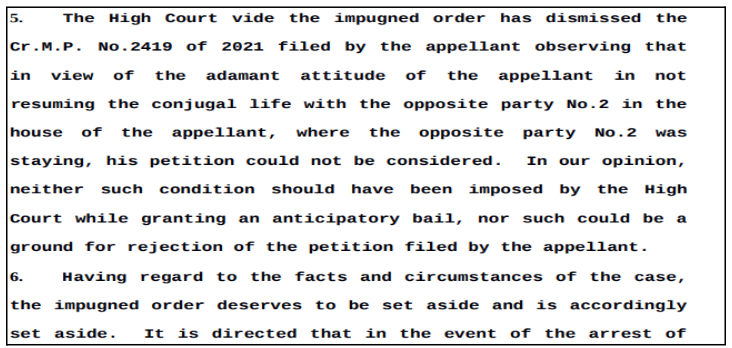
Accordingly, the SC had set aside the order of Jharkhand HC.
Kerala HC: Sexual Abuse of Minor Compounded due to the Solemnization of Marriage
In this x vs. y case, the Kerala High Court has compounded the crime of sexual abuse committed against a minor girl in violation of the Indian Penal Code (IPC) and Protection of Children from Sexual Offences Act (POCSO Act), due to the solemnization of marriage. The particulars of the case were that a man, who is the petitioner, and a minor girl were engaged to marriage. After this, while the girl was still a minor, the duo engaged in sexual activity. Later, due to the difference of opinion, the petitioner decided to cancel the marriage. This has resulted in initiating criminal proceedings against the petitioner under several sections of the IPC and POCSO Act. Subsequently, the petitioner was imprisoned. Later, both the parties have reconciled and decided to get married. Based on this fact, the Lower Court had already granted interim bail on 21 November 2023, and the petitioner was released on bail up to 21 December 2023. Following this, the marriage was solemnized on 29 November 2023. The petitioner then approached the High Court of Kerala seeking the quashing of the proceedings initiated against him.
The HC in a single sitting on 21 December 2023, had quashed the criminal proceedings initiated against the petitioner based on two principal facts. Firstly, the solemnization of marriage has taken place. Secondly, the victim, who is the wife, had no further grievance against the petitioner and had withdrawn the case. Accordingly, the HC quashed the criminal proceedings by noting that happy family life is the end of justice and that the continuance of proceedings against the petitioner would be prejudicial to the victim. The court in its judgment had also referred to several similar cases in which the offences of the accused were compounded in a similar set of facts and circumstances.
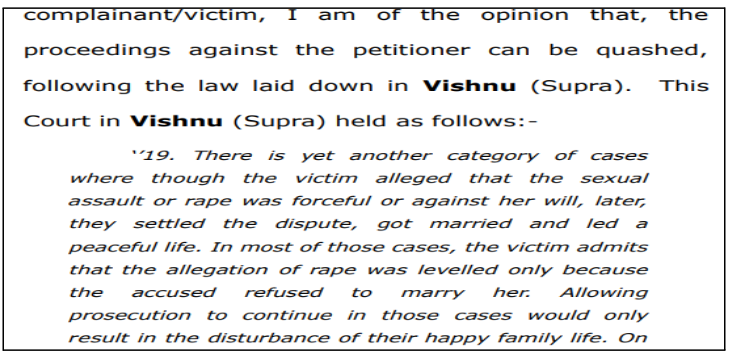
Accordingly, the proceedings against the petitioner were quashed.
Jharkhand HC: State Information Commissioner (SIC) appointed under RTI Act, 2005, without previous pensionable post cannot claim pension, though being equated to the salaries and allowances of Chief Secretary
In Sashidhar Mahato vs. The State of Jharkhand and Ors, the HC was dealing with a plea of entitlement for post-retirement pension not being extended to the former State Information Commissioner (Ex-SIC), who was appointed with no previous history of holding a pensionable post. The Ex-SIC, who is the petitioner, was appointed as SIC in the year 2005 and retired from the same position in 2011. Section 16(5) of the un-amended RTI Act, 2005, stipulated that SICs are entitled to a pension if only they held the pensionable post before they were appointed SICs. In this case, the petitioner did not hold any government post with pension service. However, the petitioner contended that since his position was being equated with the Chief Secretary (CS) of the State, the same pension benefits of the CS should also be given to him. In his support, the petitioner also sighted section 27 (2) (d) of the RT Act which stipulated that state governments shall formulate rules for paying salaries and allowances to the SICs. These rules were not formulated by the State of Jharkhand.
The court held that the provisions of the un-amended RTI Act, 2005, have stipulated that pension services are only given to those who had previously held any post with pension benefits. Further, although the SICs position is equated with the Chief Secretary, it is only applicable to the salaries and allowances, but they are not entitled to pension benefits. On the argument about rules not being framed by the State of Jharkhand, the court held that the principle of ‘empty field’ cannot be applied in this case. Accordingly, it held that even if the rules were framed, the same cannot supersede the principal act which stipulated for no pension benefits to SICs with no previous posting of the same benefits.
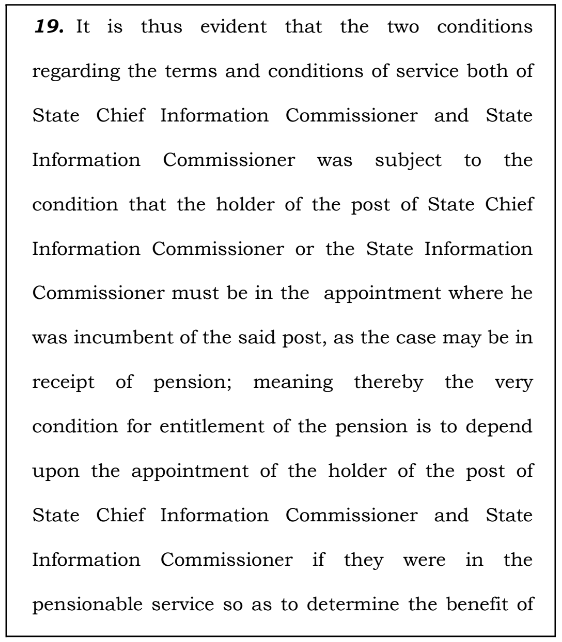
Accordingly, the court dismissed the petition.
Bombay HC: Non-issuance of Passport on the reason of Property issues over residential Address is a violation of Fundamental Right to Travel Abroad
In Rajinder Kaur Jaspal Singh Layal & Ors vs. The Union of India & Ors, the HC was dealing with non-issuance (non-renewal) of passport to the petitioner and her two children (P-2 & P-3) by Passport Authority (R-2) due to the existing dispute over her present address’ property with her brother-in-law (R-3). Petitioners contended that R-2 had earlier issued the passport to the petitioners at the same address as the property in dispute. However, the non-renewal of passports by R-2 with sighted reason is arbitrary and in violation of their fundamental right to travel abroad. The R-3 took the defence of maintainability of Writ of Mandamus when the Passports Act (PPA) specifically stipulated for an Appeal against the orders issued by R-2.
The court addressed the issue of maintainability of the petition by holding that although PPA did stipulate an appeal against the orders of R-2 as an alternate remedy, it does not take away their powers of writ jurisdiction given by the Constitution of India under Articles 226 when the issue is about the violation of fundamental rights and the lack of jurisdiction over the orders issued. The court held that since both these reasons are applicable in this case, the writ petition is maintainable. On the main issue, the court also held that PPA does not stipulate and vest power in R-2 for non-issuance of passports on the reasons of property being in dispute. Therefore, the orders issued for the non-renewal of passports by R-2 suffer from a lack of jurisdiction and violate the fundamental right to travel under Article 21, as settled long ago by the Supreme Court in Maneka Gandhi vs. Union of India. However, the court also clarified that the present judgment does not give any proper rights over the passport address to the petitioners.
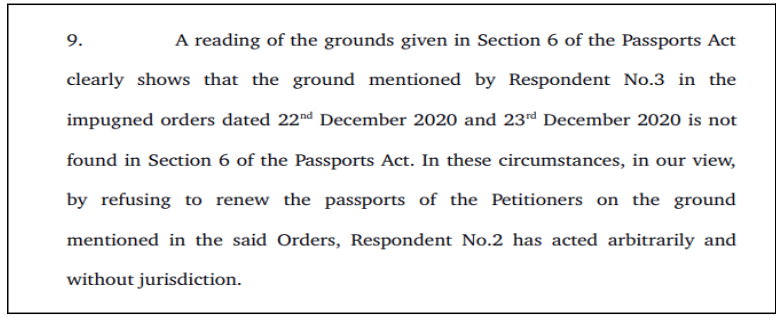
Accordingly, the court directed the R-2 to issue passports of petitioners within four weeks.
National Green Tribunal: Notes higher Air Pollution and Levies Penalty on MoEF&CC for Vague reply given
In this case, the National Green Tribunal (NGT) took suo motu cognizance of the link between air pollution and several health ailments that are caused by it, based on the Times of India (TOI) News item titled “Feeling anxious? Toxic air could be to blame.” The news item referred to various scientific studies that have established the link between higher air pollution and several health ailments such as dementia, stress, depression, Alzheimer’s, and others, which people, including children, suffer from.
While referring to these reports, the NGT particularly noted that “Adequate measures are required for control of such air polluting components and their adverse effect on various organs of the human body, especially those which are affecting the brain and emotional, psychological aspect.” Accordingly, the NGT called the respective authorities such as the Central Pollution Control Board (CPCB) and the Ministry of Environment, Forests and Climate Change (MoEF&CC) on what steps have been taken by them to control air pollution.
When the matter was taken up, the NGT noted that CPCB and MoEF&CC’s replies confirmed the presence of several heavy metals and other pollutants in the air, which are above the stipulated standards. However, it also noted that no adequate steps have been taken to control the pollution. In addition, the NGT also noted that funds that are specially assigned for environmental compensation were diverted by CPCB for unauthorized uses. Along with this, the NGT also noted that MoEF&CC has filed a vague reply and had no clarification, despite repeated queries, on the effective measures which have been to control air pollution. Hence, the NGT imposed a fine of Rs. 25,000 on the MoEF&CC.
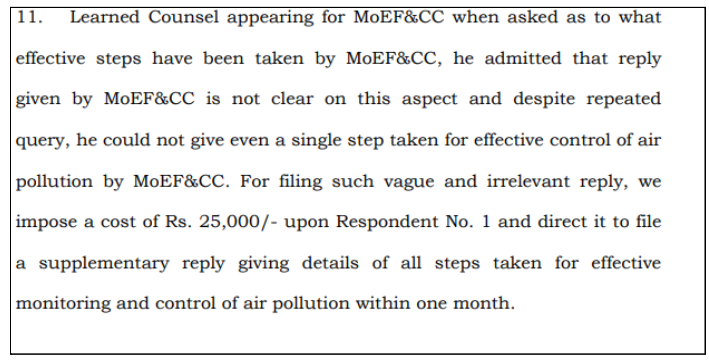
Factly’s recent articles on the rising level of air pollution among Indian cities can be read here & here.


